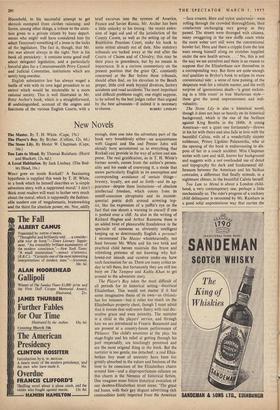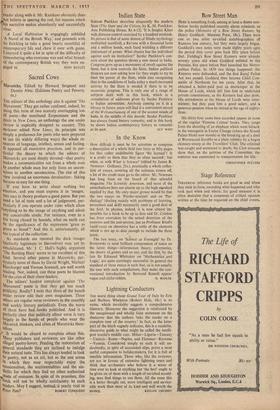New Novels
The Master. By T. H. White. (Cape, I5s.) WHAT goes on inside Rockall? A fascinating hypothesis is supplied this week by T. H. White, in a book which he himself describes as 'a simple adventure story with a suppressed moral.' I don't think most readers will want to bother very much about the moral, which is supposedly the fashion- able modern one of megalomania, brainwashing and the thirst for absolute power, etc. Nor, oddly
enough, does one take the adventure part of the book very breathlessly either—an acquaintance with Gagool and She and Prester John will already have accustomed us to everything that Rockall can provide in the way of action and sus- pense. The real gratification, as in T. H. White's former novels, comes from the author's person- ality and his mode of conveying it, a mode that seems particularly English in its assumption and corresponding avoidance of certain things— bravery, loyalty, sex and so forth—and its ap- pearance—despite these limitations—of absolute intellectual freedom, which comes from its unself-conscious abruptness and its inconse- quential poetic drift around arresting top- ics, like the expression of a puffin's eye or the fact that one shouts a warning to oneself if one is pushed over a cliff. As also in the writing of Richard Hughes and Arthur Ransome there is an added twist of pleasurable fraudulence in the spectacle of someone so obviously intelligent keeping up so determinedly English a persona! I recommend The Master wholeheartedly, not least because Mr. White and his two brisk and practical child heroes maintain this brave and refreshing pretence of not knowing why hol- lowed-out islands and caverns under-sea have such fascination for us. There are many critics to- day to tell them, but fortunately they are still too busy on The Tempest and Kubla Khan to get around to the adventure story.
The Player's Boy takes the most difficult of all periods for its historical setting—theatrical Elizabethan. This would not matter if it had some imaginative thesis of its own—as Orlando has for instance—but it relies too much on the Elizabethan property chest, though I must admit that it invests that well-worn finery with real dec- orative grace and even intensity. The narrator is a child in the players' service, and through him we are introduced to Francis Beaumont and are present at a country-house performance of Philaster. The child's emotions at the play, his stage-fright and his relief at getting through his part respectably, are touchingly perceived and are the most original thing in the book. But the narrator is too gentle, too detached: a real Eliza- bethan boy must of necessity have been too grossly absorbed in the values and business of the time to be conscious of the Elizabethan charm around him—and a disproportionate reliance on this charm is the Nemesis of historical fiction. One imagines some future historical evocation of our deutero-Elizabethan street scene. 'The great red buses, with their gay slogans advertising rich commodities lately imported from the Americas —face creams, films and nylon underwear—were rolling through the crowded thoroughfares, their conductors exchanging racy gossip as they passed. The streets were thronged with citizens, many swaggering in the new duffle coats while the more sober sort still wore the conventional bowler hat. Here and there a cripple from the late wars swung himself along on crutches supplied under the new health service. . ..' No, this is not the way we see ourselves and there is no reason to suppose that the Elizabethans saw themselves in a corresponding way. But there are quite enough real qualities in Bryher's book to eclipse its more conventional side: a sense of time passing, of the desperate wish for a reliable master, and the swift surprise of ignominious death—'a great reckon- ing in a little room' in true Marlovian style— these give the novel impressiveness and indi- viduality.
The Stone Lily is also 'a historical novel, though it does not lean so heavily on its historical background, which is the rise of the Sicilians against King Bomba in the 1840s. A young American—not a quiet one fortunately—throws in his lot with theirs and also falls in love with the beautiful Calista, wife of a wonderfully sinister nobleman, Prince Ugolino Palascordia, who at the opening of the book is endeavouring to dis- pose of her in a coach accident. Miss Chapman writes with care and skill, knows her background and suggests with a not overloaded use of detail and topography the dark and fundamental dif- ferences between the American and his Sicilian comrades, a difference that finally extends, in a nightmare climax, to the beautiful Calista herself.
Too Late to Mend is about a London child- hood, a very contemporary one, perhaps a little mechanically so. The rake's progress of a cockney child delinquent is recounted by Mr. Rainham in a good solid unpretentious way that carries the reader along with it. Mr. Rainham obviously does not believe in sparing the rod, for reasons, which is narrative makes abundantly and successfully clear.
A Local Habitation is engagingly subtitled. 'A Novel of the British Way,' and proceeds with no finicking to take a good hearty mouthful of contemporary life and chew it over with gusto. I enjoyed it quite a lot in spite of the difficulty of remembering who everyone was and what branch of the contemporary British way they were en-



































 Previous page
Previous page